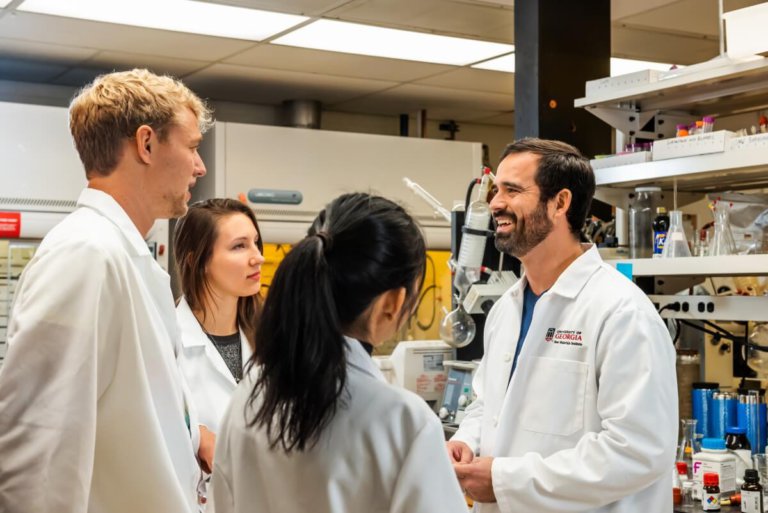
Much of the modern world as we know wouldn’t exist without chemistry. The innovations to come from this often overlooked branch of science are plenty, pretty much shaping our existence. From penicillin to The Pill to the screen you’re reading this article on, chemistry has played a huge role in making big things happen.
Chemical engineering takes this scientific discipline one step further. Applying biology, physics and mathematics, this branch of engineering transforms raw materials into useful products. At the same time, it comes up with ways for us to make products and processes safer, economical and environmentally benign.
Take pollution, for example. Many of the technologies combatting it today were created by chemical engineers. With new processes, more industrial and consumer waste is being reprocessed and reused respectively. Another success is the removal of trace contaminants from drinking water by reverse osmosis. Innovators in environmental protection include Joseph DeSimone who pioneered a family of nontoxic surfactants based on the enhanced solvency of liquid carbon dioxide, while Enrique Iglesia developed environmentally beneficial catalysts used in the fossil fuel industries.
In 2015, world leaders came together to adopt the United Nations’ Sustainable Development Goals (SDGs), a set of 17 aims that seek to ensure no country has been left behind come 2030. A big part of this ambitious blueprint is its emphasis to help save the environment. Goal 6 aims to make water clean and accessible. Goal 7 seeks to ensure access to affordable, reliable, sustainable and modern energy. Goal 12 is the promotion of sustainable consumption and production patterns. This is followed by Goal 13, the urgent undertaking to combat climate change and its devastating impacts.
Chemical engineers will play a big role in realising these goals and be in high-demand, employment-wise, while doing so. A McKinsey Global Survey on Sustainability found that more than 50 percent of executives consider sustainability “very” or “extremely” important. Around 30 percent of executives say their companies actively seek opportunities to invest in sustainability initiatives or embed it in their business practices.
It’s an engineering field brimming with opportunities and meaning. Whether you’re a professional planning to advance your qualifications or a high school graduate looking to pursue an undergraduate degree in chemical engineering, here’s our top pick of leading universities in North America to help you carve out a career in the field:
DEPARTMENT OF CHEMICAL AND BIOMEDICAL ENGINEERING, WEST VIRGINIA UNIVERSITY

West Virginia University
Real-world experiences mixed with classroom structure in the Department of Chemical and Biomedical Engineering at West Virginia University enhances your pathway to a successful career. Chemical engineering students can participate in cutting-edge research that utilize West Virginia’s expansive shale gas reserve resulting in improved economic well-being in the state and the world.
Providing competitive opportunities with the ABET accredited bachelor’s degree, along with master’s and doctoral level programs, the department prepares students with a versatile curriculum in state -of-the-art facilities. The collaborative and hands-on program allows students to solve real industry problems, and graduates achieve successful careers ranging from healthcare to polymers, and energy.
What makes WVU stand out against other institutions is undergraduate research offered at an R1 classified research institution, as reflected in the Carnegie Classification. To boost students’ employability further, annual career fairs connect them to employers for internship and job opportunities.
The Master of Science and Doctor of Philosophy degrees in Chemical Engineering encompass a spectrum of original research, ranging from new energy conversion processes, novel catalysis and surface sciences, proving to be as widespread as the industrial experience of faculty. With all this taking place, graduate school is an inspiring educational experience.
SCHOOL OF CHEMICAL, MATERIALS AND BIOMEDICAL ENGINEERING, UNIVERSITY OF GEORGIA

University of Georgia
As one of America’s best public universities, going to graduate school at this university will be a solid step for your career. At the nation’s 13th ranked comprehensive university, there are rich opportunities for interdisciplinary research, collaboration and a vibrant student life. At the same time, you’ll be able to contribute to research at the frontiers of engineering with the potential to change lives.
Several graduate programmes are offered here; one unique offering is the Master of Biomanufacturing and Bioprocessing (MBB), which emphasises the full biomanufacturing experience with hands-on training and exposure to industrial grade equipment. In addition to academic courses in engineering, science and business, students also receive professional training with cutting-edge companies through case study projects and internships. Students in this course, as well as the Master of Science in Biochemical Engineering, will benefit from the school’s research links with the NIH, NSF, USDA, DOE, EPA and various industry partners.
At the PhD level, three doctoral programmes are offered: the PhD in Engineering with an emphasis in Biochemical Engineering, the PhD in Engineering with an emphasis in Biomedical Engineering and the PhD in Biological and Agricultural Engineering. Whether it’s to conduct research for state, national and global needs, sharpening tech literacy or designing solutions to improve quality of life, the school offers numerous opportunities for all with research focused on biomanufacturing, biomaterials and next-gen therapeutics.
SCHOOL OF CHEMICAL, BIOLOGICAL AND ENVIRONMENTAL ENGINEERING, OREGON STATE UNIVERSITY

Oregon State University
Established in 1917, this is one of the oldest and most respected chemical engineering departments in the US West. Its 31 tenured and tenure-track faculty members pursue a wide spectrum of research and teaching activities, with areas of research excellence such as bioprocess engineering, sustainable energy, and water quality and treatment.
Interested candidates can apply to the Master of Engineering (MEng.), Master of Science (MS), and Doctor of Philosophy (PhD) degrees in Chemical Engineering. Areas of concentration offered are: Biochemical Reactors; Biotechnology; Electrochemical Deposition; Environmentally Benign Manufacturing; Fluidization Engineering; Materials Synthesis and Processing; Micro Energy and Chemical Systems; Polymer Rheology and Processing; Process Control/Optimisation; Thin Film Processing; and Waste Minimization and Sustainable Processing.
Whichever area you choose, the course will be tailored to individual needs and professional goals, all made possible by the close co-operation between the school and other engineering departments and research centres on campus. This makes it an ideal springboard to propel your career in traditional industries such as chemical manufacturing and waste treatment, as well as emerging industries in the semiconductor, biotech, and healthcare sectors.
DEPARTMENT OF CHEMICAL AND BIOLOGICAL ENGINEERING (CHBE), UNIVERSITY OF BRITISH COLUMBIA

University of British Columbia
UBC consistently ranks among the top 20 public universities in the world and was recently recognised as North America’s most international university.
As one of the six departments of UBC Engineering’s Faculty of Applied Science, CHBE traces its roots back to 1915, when it stood as the first Canadian chemical engineering programme west of Ontario. In 1954, a separate Department of Chemical Engineering was formed.
Today, the Department has established a global reputation for its accredited undergraduate programmes, innovative research and the quality of its graduates and faculty. Accredited since 1965, the Bachelor of Applied Science in Chemical Engineering combine lectures, hands-on lab activities, problem sessions, research, industry visits and design experiences to provide students with the balance of practical and analytical skills needed to become successful, competent engineers.
Master’s and doctoral degree programmes are administered by the Faculty of Graduate and Postdoctoral Studies (G&PS) at the Vancouver campus or the College of Graduate Studies at the Okanagan campus. The Department also offers two packages as part of the Vancouver Summer Program, a four week academic programme where international students complete two academic courses while experiencing Canadian culture.
*Some of the institutions featured in this article are commercial partners of Study International
Liked this? Then you’ll love…
Change the world with a degree in chemical engineering
University of Manchester: A global force in Chemical Engineering







